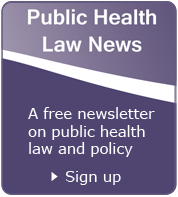Public Health Laboratories
Public health laboratories are essential to protecting America's health. They perform core public health and environmental activities including the following:
- The vast majority of public health reference tests
- Disease prevention, control, and surveillance
- Population-based interventions
- Communication with healthcare providers on appropriate patient care
- Emergency response efforts
Numerous federal and state laws, including laboratory licensure laws, health privacy laws, disease reporting, and newborn screening laws, govern and affect public health laboratories.
Training and Educational Resources
- An Overview of Legal Considerations in Assessing Multijurisdictional Sharing of Public Health Laboratory Services [PDF - 526KB] is a resource for public health laboratory directors and their legal counsel as they explore potential legal issues related to sharing testing services with other jurisdictions to strengthen the public health laboratory system. The Overview of Legal Considerations is a companion report to A Practical Guide to Assessing and Planning Implementation of Public Health Laboratory Service Changes developed by CDC and APHL and published in May 2012.
- Policy Guide for Public Health Laboratory Test Service Sharing [PDF - 889KB]
A Laboratory Efficiencies Initiative resource that public health laboratory directors and their legal counsel can use to explore legal questions about public health laboratories’ sharing test services across states and other jurisdictions.
Disclaimer: Information available on this website that was not developed by the Centers for Disease Control and Prevention (CDC) does not necessarily represent any CDC policy, position, or endorsement of that information or of its sources. The information contained on this website is not legal advice; if you have questions about a specific law or its application you should consult your legal counsel.
- Page last reviewed: April 16, 2014
- Page last updated: April 16, 2014
- Content source:




 ShareCompartir
ShareCompartir



